For centuries, yerba mate has been considered a gift from the gods. Coffee lovers enjoy it as well since yerba mate caffeine content is significantly higher than other teas.
Yerba mate was central to South American life for medicinal and nutritional purposes. That’s because it’s high in nutrients that are valuable in maintaining proper health. Besides caffeine, it is high in antioxidants, vitamins, and minerals.
It was not until yerba mate became in demand in other parts of the world that its nutritional value was studied. We already know that it can be valuable for weight loss, improving brain function, increasing energy, and boosting immune systems.
Yerba Mate reduces anxiety, protects the heart, regulates blood sugar levels, and protects against infections. We are still learning what a valuable part of the diet this beverage can be and its benefits on our health.
Contents
Yerba Mate Caffeine
Does Yerba Mate Have Caffeine?
Yerba mate is naturally caffeinated. Its caffeine content is typically somewhere between that of coffee and green tea.
One cup of coffee has an average of 95 mg of caffeine. Green tea has around 25 mg. Yerba mate splits the difference with about 70 mg, depending on how you drink it.
Yerba Mate Caffeine Content
A tea bag of yerba mate has the lowest amount of caffeine, probably around the same amount as green tea. If you brew your yerba mate in a french press, you will get a slightly higher caffeine content.
Loose-leaf yerba mate prepared in a gourd will give you the most caffeine boost of all. Your energy will take you even further with a gourd full of yerba mate.
Also, a 2009 study discovered that traditionally dried leave have a significantly higher amount of caffeine than fresh leaves.
The caffeine content in each variety of yerba mate will vary depending upon where and how the plant was grown. Soil type, amount of sun versus shade, and moisture can affect how much caffeine is in each batch.
Similarly, processing methods will determine how much caffeine is maintained in the leaves and stems used to make the yerba mate.
Yerba Mate Caffeine vs. Coffee
The caffeine in yerba mate seems to have a different effect on people than the caffeine in coffee. When you drink a cup of coffee, you may notice that you feel a little jittery and shaky after you’ve finished it.
Then you crash, feeling just as tired, if not more than you did before you drank. On the other hand, Yerba mate contains two alkaloids not found in coffee, theobromine, and theophylline.
Theobromine has the effect of making you feel good. It is also found in chocolate, which may explain why people turn to chocolate so frequently for an emotional pick-me-up. Theobromine is slightly bitter, which may lend your cup of yerba mate its unmistakable taste.
Theophylline acts as a mental pick-me-up. It increases your ability to concentrate.
The ratio of caffeine, theobromine, and theophylline in yerba mate is different from coffee and tea. Coffee and tea have lower levels of both theobromine and theophylline. This can explain why, while all drinks provide a tremendous energy boost, only yerba mate is a clean, smooth one. The result of these three components combined is that you feel energetic, and your mental fatigue is reduced.
Yerba mate is the healthier beverage choice. Coffee does not contain the nutrients that yerba mate does. The few nutrients that it may contain are wasted anyhow; coffee seems to block the body from absorbing certain minerals.
Caffeine in Yerba Mate Energy Drinks
Yerba mate energy drinks and energy shots have become very popular in recent years. You can find a wide variety of them on the market (though they don’t seem to be popular at all in yerba mate’s home countries!).
These are designed to give you a large boost of caffeine, thereby increasing your energy. A bottle of a yerba mate energy drink may have up to 90 mg of caffeine per serving. An energy shot boasts caffeine content levels as high as 140 mg per 8 oz serving.
Beware of both of these bottled energy drinks, though. They are both highly flavored and sweetened. The added sugars and other unnatural ingredients greatly outweigh the nutritional advantages of plain yerba mate.
No matter how many benefits caffeine can provide, some people are simply very sensitive to it. It is best to avoid yerba mate energy drinks if you get headaches, nausea, or a racing heart after drinking the beverage.
The Myth of Mateine
Many proponents of yerba mate will tout that it doesn’t have caffeine but a different chemical called mateine. This seems to be a fallacy; science has not identified any such thing.
Mateine is just another word for caffeine, likely derived from the word mate. This myth likely arose in an attempt to explain why yerba mate’s effect feels so different from coffee or tea.
Other Ingredients
Vitamins
It is rare to find one plant that contains so many necessary life ingredients. Yerba mate contains several essential vitamins: A, B1, Be, B3, B5, C, and E.
Not only does this beverage provide all these nutrients, but it has many of them in high concentrations. If you drink a few cups of yerba mate each day, you will benefit from this vitamin boost.
They will provide fortification for your immune system and also promote greater health for your body.
Vitamin B1 is also known as thiamin. It metabolizes glucose levels and is essential for the performance of nerves, muscles, and heart.
B6 plays an important role in metabolizing carbohydrates and fat. Vitamin B5 is responsible for creating new red blood cells.
Niacin, or B3, is crucial in repairing DNA, cell function, and lowering cholesterol. It can also give brain function a boost.
Vitamin C is not tremendously high in yerba mate, so you cannot count on that as a great source for this vitamin.
Minerals
Yerba mate is a good source of important minerals, as well. It is high in potassium, which assists in body development, metabolism, and lowering blood pressure.
Yerba mate is also rich in phosphorous, iron, calcium, magnesium, zinc, manganese, sodium, and sulfur.
Polyphenols
Polyphenols are a powerful group of antioxidants. With 11 different kinds, yerba mate has more of these than any type of tea! Polyphenols play a role in preventing strokes and some chronic diseases, but their most important job is preventing certain cancers.
Antioxidants are one of the most valuable components any food can have. They help fight against the oxidation of your body’s cells. Oxidation in your cells can hasten the aging process and the breakdown of vital body functions.
Flavonoids
The flavonoids in yerba mate have anti-inflammation effects. They can improve overall health by reducing the risk factor of chronic diseases.
Calorie Content
Regular, loose-leaf yerba mate tea has a minimal calorie count. It only has five calories per 8 oz. serving. If you are drinking yerba mate in hopes of taking advantage of its weight loss benefits, it isn’t for the low calories.
While they help your weight loss goal, other factors make yerba mate good for losing extra pounds. It is mainly the caffeine that makes it a weight-loss champion. The caffeine boosts your metabolism and burns more energy, therefore burning more fat.
This is definitely where you want to stay away from yerba mate energy drinks and energy shots. They are mainly sugar and countereffect any fat-burning effects from the caffeine. Sugar will only increase your waistline, so if you want to drink these bottled beverages, do so in moderation.

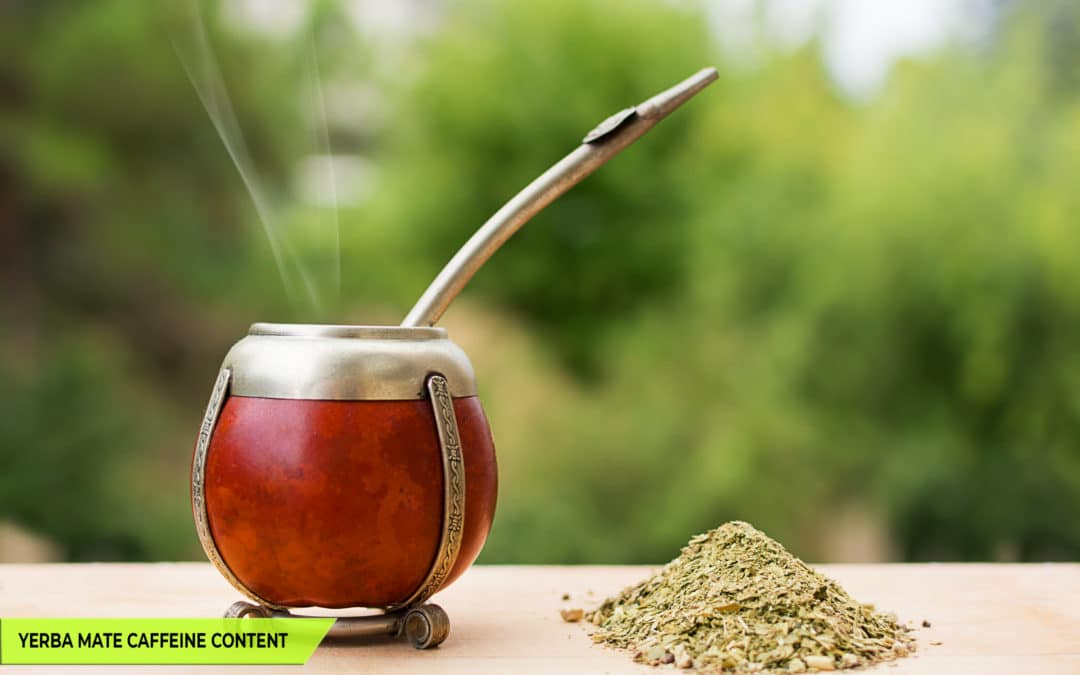
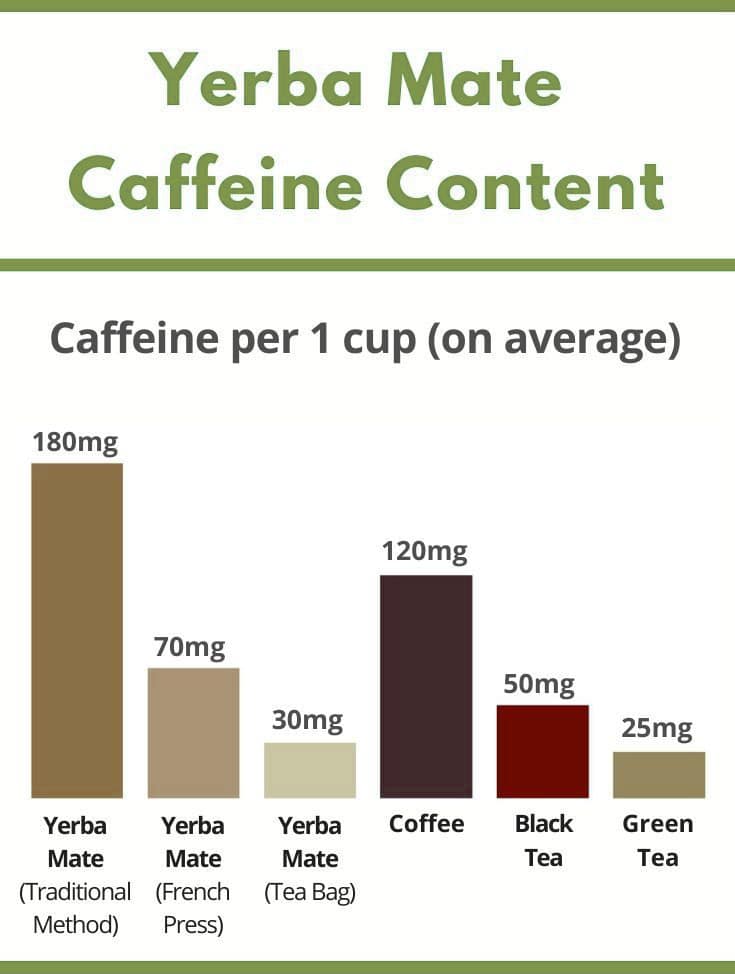
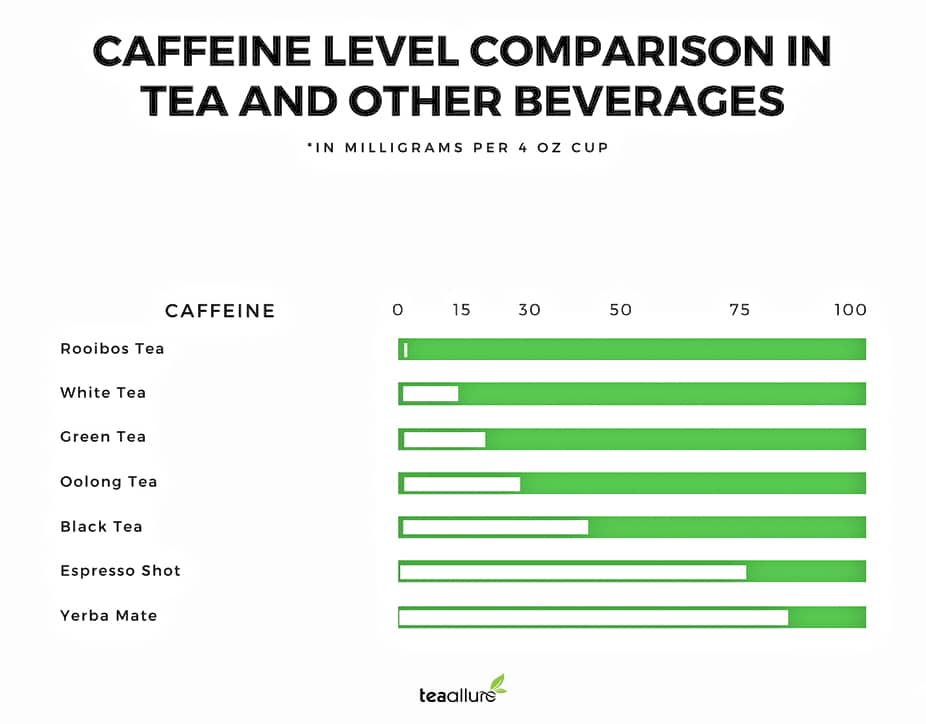

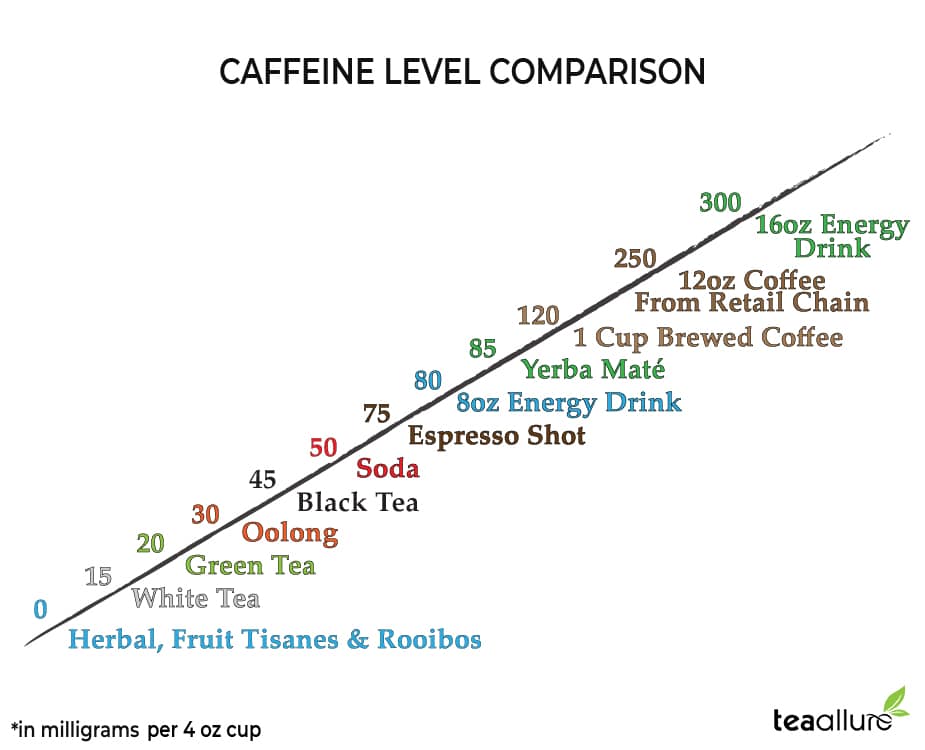
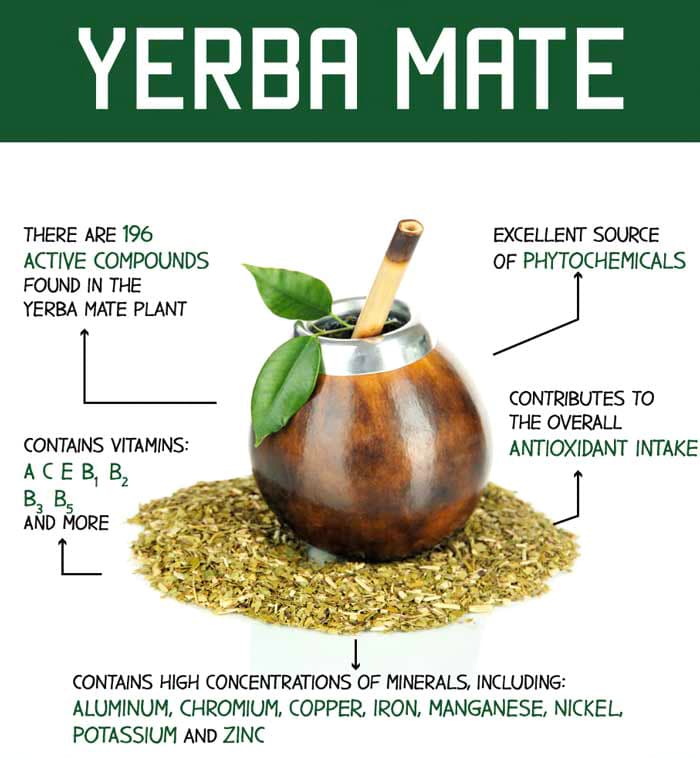
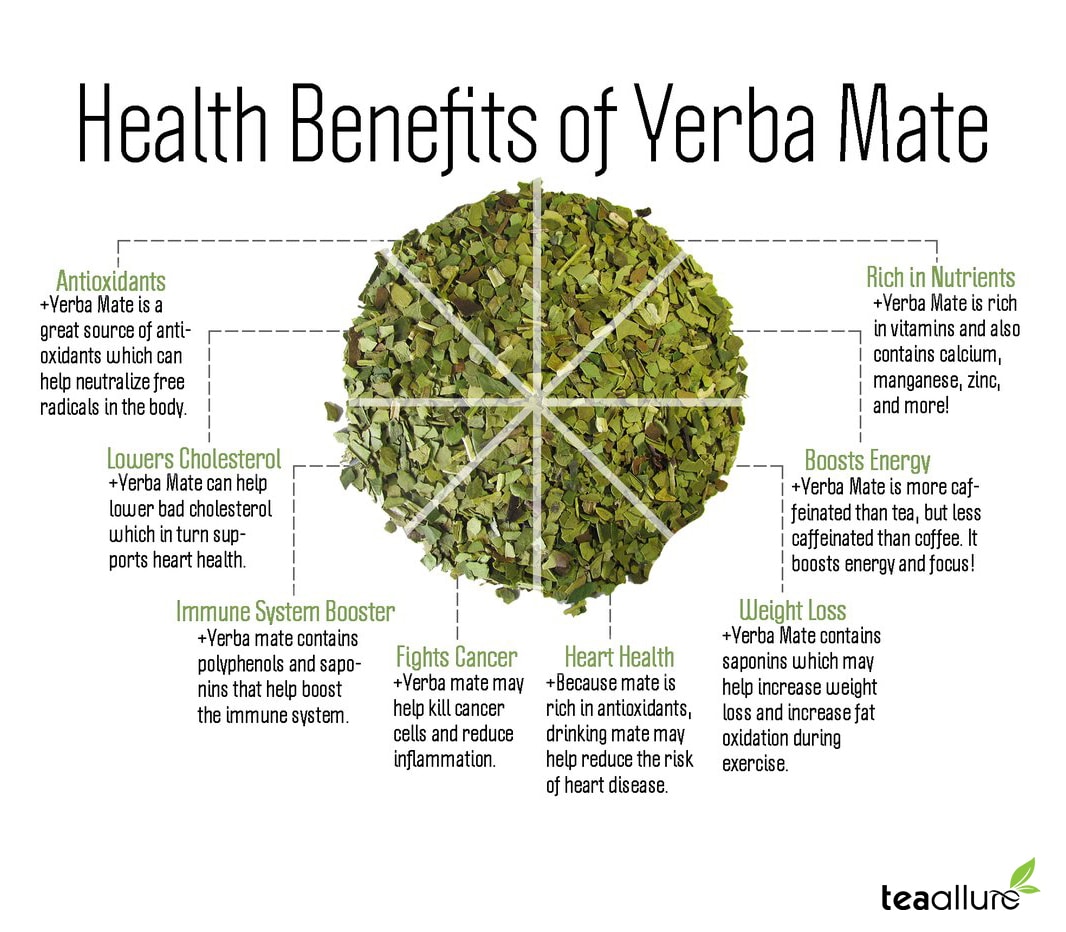
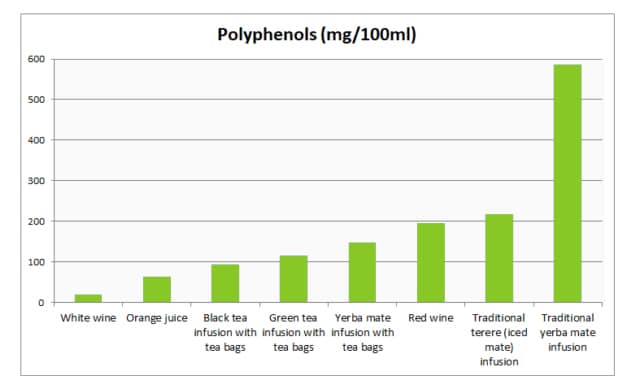
 Hi, my name is Abigail Bradley, founder of TeaAllure. Tea is my passion, and this blog is dedicated to provide all the information for this marvelous gift of nature.
Hi, my name is Abigail Bradley, founder of TeaAllure. Tea is my passion, and this blog is dedicated to provide all the information for this marvelous gift of nature.